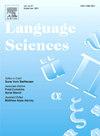When translation meets dissemination: Translations of the Chinese diplomatic term Mìngyùn Gòngtóngtǐ in English news reports
IF 1.1
2区 文学
Q2 EDUCATION & EDUCATIONAL RESEARCH
引用次数: 0
Abstract
English news reports have disseminated discrete translations of the Chinese diplomatic term Mingyun Gongtongti (a community with a shared future). This study scrutinizes the numbers, contents, and attitudes of English news reports to evaluate whether and how modifications in the translation of this term changed its dissemination. A corpus of English news reports incorporating translations of this diplomatic term was constructed for this study. Subsequently, semantic network analysis, machine-based sentiment analysis, and manual analysis of affect markers in accordance with the Appraisal System were performed. The study results revealed that amendments in how the term was translated caused changes in its dissemination. The number and overall positivity of news reports increased significantly and the contents of news reports became more specific after the translation changed to a community with a shared future. However, Western news reports subtly steered the discernment of the term by their audiences. They strategically selected linguistic resources to express their concerns and display unsupportive attitudes toward the term. This positioning emanated partly from ideological differences, profit maximization motives, and geopolitical tensions. This study argues that translations of diplomatic discourses must be restricted by factors in the field of communication. The role of translation in the making of international politics through media, as well as the role played by the media in the handling of international relationships by translating terms and broadcasting their renditions, are of great significance.
当翻译遇到传播:中文外交术语Mìngyùn Gòngtóngtǐ在英文新闻报道中的翻译
英文新闻报道中散布着对中国外交术语“命运共同体”的不同翻译。本研究考察了英语新闻报道的数量、内容和态度,以评估这个术语的翻译修改是否以及如何改变了它的传播。本研究构建了一个包含该外交术语翻译的英语新闻报道语料库。随后,根据评价系统进行了语义网络分析、基于机器的情感分析和情感标记的人工分析。研究结果显示,对该术语翻译方式的修改导致了其传播的变化。在翻译成命运共同体后,新闻报道的数量和总体积极性显著增加,新闻报道的内容更加具体。然而,西方新闻报道巧妙地引导了受众对这个词的理解。他们策略性地选择语言资源来表达他们对这个词的关注和不支持的态度。这种定位部分源于意识形态差异、利润最大化动机和地缘政治紧张局势。本文认为外交语篇的翻译必须受到交际领域因素的制约。翻译在通过媒体制造国际政治中的作用,以及媒体通过翻译术语和传播术语的释义在处理国际关系中的作用,都具有重要意义。
本文章由计算机程序翻译,如有差异,请以英文原文为准。
求助全文
约1分钟内获得全文
求助全文
来源期刊

Language Sciences
Multiple-
CiteScore
2.90
自引率
0.00%
发文量
38
期刊介绍:
Language Sciences is a forum for debate, conducted so as to be of interest to the widest possible audience, on conceptual and theoretical issues in the various branches of general linguistics. The journal is also concerned with bringing to linguists attention current thinking about language within disciplines other than linguistics itself; relevant contributions from anthropologists, philosophers, psychologists and sociologists, among others, will be warmly received. In addition, the Editor is particularly keen to encourage the submission of essays on topics in the history and philosophy of language studies, and review articles discussing the import of significant recent works on language and linguistics.
 求助内容:
求助内容: 应助结果提醒方式:
应助结果提醒方式:


